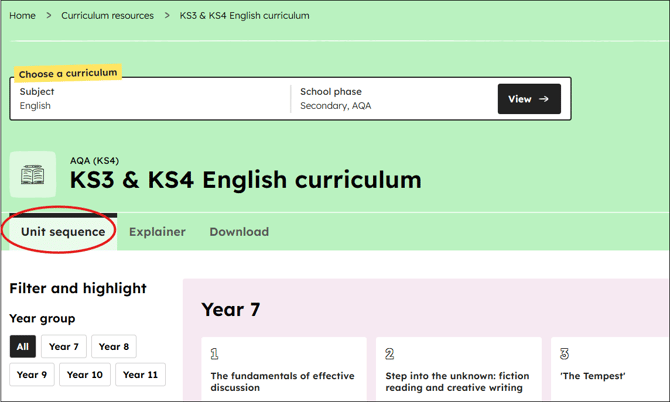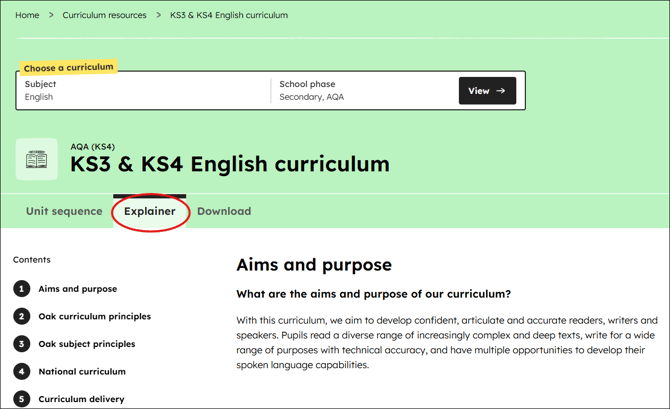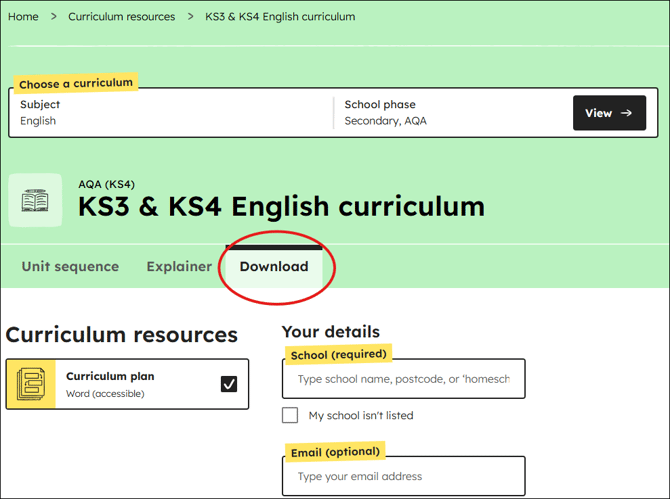Our English curriculum
Find out more about our English curriculum and read our FAQs
Contents
- Introduction
- Unit sequence
- Curriculum explainer
- Download
- More about our English curriculum
- Are all the English resources available?
- FAQs
✅Preparing for the revised national curriculum
We're updating our teaching resources and curriculum plans and sharing guidance to help schools prepare confidently and reduce workload ahead of the revised curriculum in September 2028, and the updated GCSEs beyond.
Sign up now to receive: 
- the latest updates
- expert guidance
- invitations to webinars
- free resources and helpful content.
Introduction
We’ve worked closely with curriculum partners, subject experts and teachers on our interactive English curriculum plan.
Our curriculum partners for English are:
- English primary: Fox Federation
- English secondary: Twyford Church of England Academies Trust
You can read more about how our expert groups helped shape our curriculum thinking in our Blog: Collaborating with our English expert group.
Find out more about how to use our interactive curriculum plans and adapt them for your school in our help article: A guide to our curriculum plans.
Unit sequence

You can view our curriculum sequence using the unit sequence tab. It will display the units available for each year group, how many lessons are available in a unit and a recommended order.
All units have a description of 'why this, why now' and 'prior knowledge requirements' to help you consider the sequence of your current planning.
You can look at how threads develop across an entire phase or filter the view to see a single year group.
Curriculum explainer

We've added a curriculum explainer to our English curriculum to help you understand our thinking when we were making them with our curriculum partners.
For English this will help you understand:
- our overarching curriculum approach and the subject principles we used
- how our curriculum reflects the aims and purpose of the national curriculum
- information on delivering it in your school
- how we use threads to provide curriculum coherence.
Download

More about our English curriculum
In our primary English curriculum video guide, our English subject lead Chris Fountain, explores the key thinking behind the creation of our primary English curriculum with Emma Madden from Fox Federation.
In our secondary English curriculum video guide, our English subject lead Chris Fountain, talks to Sam Barnsley from Twyford Academies Trust to highlight some of the thinking behind the design of our secondary English curriculum.
Find out more about a primary school in England that is using our English resources in our blog: How a school is transforming English teaching with Oak’s curriculum.
Are all the English resources available?
The majority of our lesson planning and teaching resources for primary and secondary English are now available on our website.
Our new units and lessons all have a ‘New’ label beside them.
![]()
You can see what lessons we are covering in each unit by clicking into the unit information on the unit sequence page.
- English KS1 and 2 unit sequences
- English KS3 and 4 unit sequences for:
FAQs
The approach to our English curriculum
How are you building oracy into English?
It is important to us that pupils are given many discussion opportunities so this is an integral part to all lessons in the curriculum giving pupils a chance to express their views clearly and can develop confidence in doing so.
However, we also explicitly teach pupils how to structure and present their ideas orally. This includes an 'Introduction to debate' unit in year 5 where pupils learn and practise the building blocks of making an oral argument and the year 8 unit 'Victorian childhood' where pupils learn how to give a presentation.
What is a ‘book club’ unit?
'Book club' units are not full reading units. Rather than focusing on building up pupils' fluency or comprehension, these book club units are focused on exploring and discussing the themes, plot and characters of the text. The expectation is that pupils will have read the text before starting the 'book club' units as the unit is solely focused on whole text exploration.
Will there be teaching resources for English language? And if 'yes', are they provided as separate resources, or embedded into literature teaching?
Yes, we provide resources for English Language. English language teaching is both embedded into literature teaching and taught separately during key stage 3. At key stage 4, we have specific English language units that cover fiction reading, fiction writing, non-fiction reading and non-fiction writing.
How do you encourage your children to think like a writer?
There are lots of ways in which this is achieved. It is important that pupils read like writers and write like readers to help them reflect thoughtfully on texts and write their own thoughtful texts. Where appropriate during reading lessons, pupils are asked to discuss 'why has the writer done this? what other choice could they have made?' Similarly, where appropriate during writing lessons, pupils are asked to think about how they would respond as a reader.
How should I use your handwriting content?
Our handwriting lessons are designed to be used flexibly to suit your context. One of these lessons features four learning cycles, one of which is a warm up. Whilst you might want to do a single extended handwriting lesson per week, we would recommend doing three shorter handwriting lessons focused on one learning cycle each, with the warm up repeated in each mini lesson.
Our primary English curriculum
How does our approach to reading, writing and grammar interact with the individual lesson in English?
We have sequenced our primary English curriculum in different domains: handwriting, spelling, grammar, vocabulary and reading, writing and oracy.
We teach handwriting, spelling and grammar discretely so that pupils can develop confidence in these areas outside of their reading, writing and oracy lessons.
However, the content from those discrete lessons is revisited in the relevant reading, writing and oracy lessons so that pupils are learning how to use and apply a certain grammatical construction, and utilise that knowledge in context.
How should I organise your primary English content across the day and week?
This is for you to decide within the structures of your timetable. The curriculum is designed so that pupils do one reading, writing and oracy domain lesson per day, and then study a selection of grammar, spelling, handwriting and vocabulary throughout the week.
How do I ensure my primary English curriculum aligns with the rest of our curriculum?
We offer options in some of our non-chronological report units to help you align the content with the topics you are studying in other parts of our curriculum
Our curriculum texts
How have you selected the texts to teach in English?
Our Subject Lead Chris Fountain has discussed some of the key challenges for text selection and how we have solved that problem for the Oak curriculum in his Blog: Selecting texts to teach in English.
Why have you chosen these texts for literature? Do they all belong to a traditional ‘canon’?
Simply, because we think they are great! We think all pupils should read these texts as they are entertaining, enlightening and thought provoking. We have got a range of different text types from a range of time periods, with everything from old English through to twenty-first century classics.
What should we consider if we are teaching different texts to the Oak curriculum?
You need to consider whether the text you want to fit into the curriculum works within the same curriculum thread. Is it building up understanding and knowledge of the same concept, and therefore building towards the same later texts in the curriculum? For instance, if you were to remove 'Small Island', you would want to ensure the text that replaces it also focuses on migration and community and helps build pupils towards study of 'Leave Taking'.
Which texts should I choose for key stage 4? Do I need to adapt key stage 3 to support them?
Within your exam board, you should select the text you think is most interesting and exciting for your pupils. Our key stage 3 curriculum builds towards all of the outcomes, so whether you select 'Animal Farm' or 'Leave Taking' for instance, the key stage 3 curriculum will have prepared you.
Does my school need to purchase whole texts?
Yes, we would expect schools to purchase the texts because it is not possible for us to provide the full text in our lesson resources. It is also preferable to read a book rather than a screen.
Exams and exam boards
How do you prepare pupils for exams? What exam skills are they taught?
Our curriculum does not feature any exam practice, and no exam skills are taught. Instead, with literature, we develop pupils' critical thinking and knowledge of the text. With language, we look at a range of fiction and non-fiction and explore how they are constructed.
What exam boards are you aligned with for GCSE?
We are aligned to AQA, Edexcel and Eduqas in GCSE English Literature and GCSE English Language.
If you are looking for a sequence for a particular exam board you can choose this at the beginning of your search from the Oak’s curricula page.
- First choose your subject and select the secondary phase.
- You will see which exam board sequences we have available for you to view.
- Select your preferred exam board and press View.
With English Language, we deliberately do not practise exam skills or questions. Instead, we give pupils regular practise of reading and writing fiction and non-fiction, particularly through the exploration of short stories and articles.
For English Literature, we cover a range of texts that are included in the specifications for two or more of AQA, Edexcel and Eduqas. We also cover at least two poetry anthologies for each exam board, except Eduqas which only has one poetry anthology.